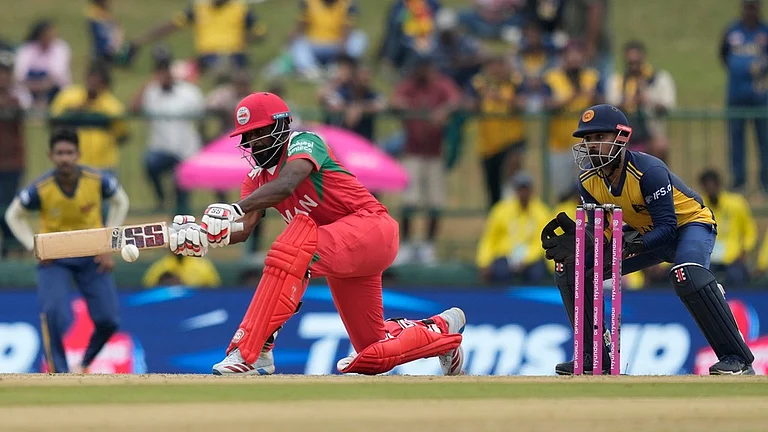Even though the dust over Chinese tennis ace Peng Shuai has barely settled, China found a new star on the highest horizon of the racket sports. Teenager Zheng Qinwen has created quite a sensation by reaching the fourth round of the French Open but off the revered red clay of Roland Garros, she caused quite a flutter by publicly uttering the word that has been predominantly spoken in hushed voices. (More Tennis News)
Despite winning the first set against eventual French Open champion Iga Swiatek of Poland, 19-year-old Zheng had to bite the dust in the fourth-round match at Court Philippe-Chatrier. But while speaking to the reporters after the match, the Chinese voluntarily brought up the otherwise taboo matter of menstruation or period.
“Yeah, the leg was also tough. That compared to the stomach was easy... I cannot play my tennis, (my) stomach was too painful,” the world no. 74 player dropped a hint first before elaborating, “It's just girl things, you know. The first day is always so tough and then I have to do sport and I always have so much pain in the first day. And I couldn't go against my nature.”
Clearly indicating at the women’s monthly cycle and the ensuing health hazards, Zheng further remarked “I wish I can be a man on court, but I cannot in that moment... I really wish I can be (a) man (so) that I don't have to suffer from this.”
Fu fighter sheds inhibitions about period
Menstruation or period has been not only a taboo word in most of the countries, including China, but also in the world of sports. Even the sportspersons from the developed and western countries mostly refrain from publicly talking about it due to the age-old social stigma associated with it. It’s like an elephant in the room as everyone knows about its existence and impact on women athletes but no one publicly talk about it.
But a bold Zheng, who made her debut in majors only this year, was frank, fearless and forthright enough to unabashedly spoke about the regular health transformation women undergo every month.
Interestingly, a few years ago, another Chinese athlete talked about it on the global stage breaking the internet. Swimmer Fu Yuanhui made headlines for telling a reporter from the Chinese state media CCTV she was on her period after finishing fourth in the women's 4x100 meter medley relay at the 2016 Rio Olympics. While responding to a question on her performance, Fu was more direct as she quite unassumingly remarked in Chinese, “Actually, my period started last night, so I'm feeling pretty weak and really tired.”
Chinese netizens talk about taboo topic
Of course, both Fu’s public disclosure of her period without any inhibition and the recent revelation by Zheng raised a few eyebrows in China but that highlighted a slow but slight paradigm shift.
“Different generations of Chinese people have different opinions towards the topic of the period. For instance, for my mother’s generation it would be more sort of shame but for my generation, we discuss the topic of period very openly,” said Cindy Zhang a Beijing-based communication studies professor and an expert in South Asian Studies.
Zheng’s period remark has found its way into the Chinese social media as a number of netizens, apart from hailing her phenomenal progress at Roland Garros, discussed about her menstruation issue.
For example, a Chinese with the username of AndyMu posted on the official Weibo account of the WTA, “Is she having her period? That’s so difficult for female players.” Similarly, another Chinese netizen wrote on the official Weibo handle of the French Open, “If she were not in period time, she would be number 1.” On the same Weibo account another netizen commented, “The first day of period! The most difficult thing. Cannot imagine she can insist! I can see the pain of sweat on her head.”
Changing the perception about period in China
For generations and centuries, China's traditional beliefs about menstruation have been quite pervasive and menstrual blood is mostly seen in Chinese culture as “polluting” and “dirty.” In fact, a study by Cordia Ming-Yeuk Chu in 1980 postulated that the Chinese believe the period disrupts the natural forces of the body they call “yin” and “yang.”
However, the recent trend, including numerous Chinese netizens asking many questions about taikonaut Wang Yaping’s menstruation in space during her six-month stay in China's space station core module Tianhe, has been portraying a sea change in the mindset of the modern Chinese society.
“In my generation in China or even people who are younger can just talk about period very natural way and it’s not something forbidden or something we cannot talk or discuss,” Cindy informed. She further added, “I remember when I was 5 years old and I was watching a marathon competition on TV, I still remember the anchor said the Chinese sportswoman who is competing today is during her period. She has done some extra works to prepare and she has changed her pad before the race.”
Chinese celebrities destigmatizing period
Shanghai-born Chinese actress and influencer Angelababy, whose real name is Angela Yeung Wing, carried out an open conversation about the so-called taboo topic to her 85 million social media followers after being criticised for not being soaked in freezing cold water during a reality TV game show Keep Running (benpaoba) in 2018.
Tianjin-based architect and entrepreneur Heather Li mentioned, ‘I think it’s no longer a big deal for us to tell our male friends or colleagues about not feeling well due to period. So, I am not surprised by the public remarks by Fu or Zheng.”
In 2017, Swedish hygiene and health brand Libresse launched their worldwide popular sanitary napkin brand in the Chinese market with a “stop hiding your period” or #yuejing bu yincang# campaign, featuring Chinese actress Zhou Dongyu, apart from unveiling a private offline exhibition, shared with the Chinese netizens via a livestream on Alibaba-owned Chinese online shopping platform Taobao. “Good that more women of our generation or younger generation are speaking up about this erstwhile taboo topic. It’s good for the Chinese society as a whole,” Heather, who studied in Italy, explained.
China’s combat with period problems
However, a recent research paper titled “Teenage Girls Physiology Health Insight Report,” jointly published by Meiyou (a Chinese app on women’s period health) and Beijing-based Maple Women’s Psychological Counselling Centre in 2020, found that 50% of teenage girls in China have limited knowledge about menstruation while almost 87% of them feel uncomfortable during their menstruation and they significantly lack guidance.
In order to keep the so-called stigmatic M or P word secret, the Chinese society, especially the women, have got many euphemisms for period such as “eldest aunt” (Dayima), “The thing comes” (laishi), “Regular holiday” (lìjià), “That comes” (lai nage), “Special situation” (tèshū qíngkuàng), and “Not convenient” (bù fāngbiàn) to name a few.
“In China, these days mostly girls discuss about period with girls, but not with boys. But yes, girls do talk about it with their boyfriends or partners or sometimes, even intimate friends. Sometimes they talk about it with their close male colleagues as well,” Jenny Zhang pointed out. But the Beijing-based HR professional also informed, “Many Chinese companies do have HR policies for their female employees as they give a day or two offs for women during their menstruation days of the month.” Incidentally, several Chinese provinces, including Anhui, Shanxi, Hubei, have designated period leaves for a day or two every month for female workers.
The last great sporting taboo
As far as women’s tennis is concerned some of its most outspoken champions including an ever-vocal Martina Navratilova, who even unabashedly slams many heads of states or regimes at the drop of a hat on a wide-range of issues, often remained tight-lipped about its impact on the performances of women sportspersons during their playing days.
However, after British tennis player Heather Watson spoke openly about the “last great sporting taboo” following her first round of the Australian Open in 2015, Navratilova too broke her long silence on the issue and how did it nearly “cost” her a Wimbledon title in a BBC Radio interview.
Notably, many Indian athletes like Olympic medallist and boxing icon MC Mary Kom, World Athletics championship medallist long jumper Anju Bobby George, and squash star Joshna Chinappa in recent times have spoken openly about the so-called “forbidden” issue. But Zheng’s open discussion about period at Roland Garros has certainly been a ground-breaking moment as the silence around menstruation in sports has been quite deafening for decades.
(Suvam Pal is an independent media professional, author & documentary filmmaker. He tweets @suvvz.)

























